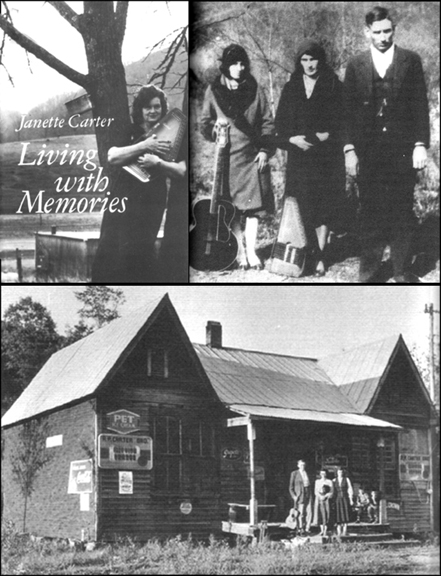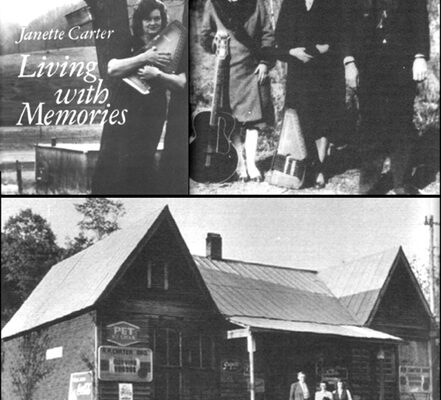Over the years, countless old-time Appalachian music lovers have pleasant memories of attending the Carter Family Fold in Maces Springs, VA on Saturday nights. Located in Poor Valley just outside Hiltons in the beautiful Clinch Mountains of Southwest Virginia, the quaint atmosphere of the rustic Fold is a favorite setting for those who love the musical genre once popularized by The Carter Family.
Sara, A.P. and Maybelle recorded between 1927 and 1956, making their first records at Victor’s Bristol Sessions. Their offering was a mixture of ballads, traditional tunes, country songs and Gospel. Scores of books have been written about the “First Family of Country Music,” but one publication stands tall among the rest. It is from the daughter of A.P. and Sara – Living With Memories by Janette Carter (Carter Family Memorial Music Center, 1983). The 84-page softbound book features a glimpse into the heart of a hard-working, God-fearing lady who was born, lived and died in her beloved Clinch Mountains. The work focuses mainly on family values rather than musical prowess and makes clear her adoration for her ancestors.

Poor Valley lies between Clinch Mountain and a large hill called the “Nob.” People living there were often perceived as being poor, but, according to Janette, “they were rich in their love of nature and God’s creation.” Some of her most cherished memories were at her home, her grandparent’s place; the Carter Store; Maces Springs School, Mount Vernon Church, the hills, meadows, valleys, mountains and Old Clinch.
Life was arduous. Daily chores included feeding chickens, hogs and cows; drawing water from the well; and building fires in the cook stove and fireplace. Winters required a hefty supply of firewood from Clinch Mountain that was produced using an old crosscut saw. During harvest time, neighbors helped work the big thrashing machine. Afterward, Mom and her children emptied ticks (bed mattresses) and filled them with fresh straw from the fields. After that, they plucked geese and ducks to replenish feather pillows. The family hoed corn, cut or pulled weeds, planted seeds and tended to tobacco. They subsisted on what they raised on their fertile country land.
Janette fondly recalled her mother’s ham meat, tomato gravy and blackberry pie. On Sundays, there was often the added luxury of chicken and dumplings. Mama Carter was an immaculate housekeeper; her bedding was as white as winter’s fresh snow that blanketed the countryside.
A.P. often related the story of how he and Sara met. He was selling fruit trees and stopped by a farm in Midway, Virginia. He heard a beautiful voice in the distance singing “Engine 143.” Her vocal refrain and Autoharp strumming enchanted him. When he approached her, he depicted her as the most beautiful girl he ever saw, having eyes that shown like diamonds. The two eventually married. Her family deemed her plaintive songs more beneficial during illnesses than any store-bought medicine.
A.P., whose singing voice ranged from high to low, could find scales and chords with ease. Once, while his mother was carrying him in her womb, lightening struck a tree where she was picking apples, spreading fire around her. The incident is blamed for her son’s hands trembling for the duration of his life.
In the spring, Janette loved to walk among the elder bushes, gather clusters of blackberries, sit by cool mountain streams, listen to the water rush over rocks, observe minnows swimming about and touch the damp, green moss on the rocks.
The train passed the Carter home twice each day. Janette routinely waved at the engineer from her front porch as the big steam locomotive chugged along, bellowing coal smoke from its stack and emitting a mournful sound from its steam whistle. Afterwards, the prudent daughter walked along the track with a bucket, collecting small lumps of coal that had fallen from the train. Coal produced a hot fire and saved firewood.
Grandma Carter canned big jars of kraut, pickled beans, shuck beans, apples and apple butter. She cooked a blackberry jam consisting of part berries and part apples, stirred it all day and put it in big crocks. She also fried streaked meat in a large fish fry iron pan, crumbled the meat and grease into her bread and baked it in the old wood stove. A big smear of butter on it made it a delight.
Mount Vernon Church, built by people in the valley, was located just down the road from the Carter home. Every Sunday morning, people walked there from all across the valley. The service consisted of singing, preaching, praying and shouting. The preacher always ate lunch at one of his member’s homes. Janette related a life-changing experience for her when A.P. took her to a revival meeting. There she found Jesus, joined the church and got baptized in the river.
In 1938, the family moved from Poor Valley to Del Rio, Texas where they joined Maybelle, Helen, June and Anita for a stint on XERA, a large radio station in Villa Acuna, Mexico. The station produced transcriptions that were distributed to radio stations. A year later, A.P. and Sara divorced, but continued performing until their retirement in 1943. By then, Janette had become an accomplished musician in the Carter tradition.
Janette made a promise to her aging father that she would carry on the family’s musical heritage after his passing; she was true to her word. The dream first took root when she turned the rural Carter Store into a Saturday night old-time music gathering. Over time, there was a need for a larger facility. With help from her equally musically talented brother, Joe, the performance was moved next door to a spacious 842-seat wooden facility known as the Carter Family Fold. Notably displayed on the stage wall were photographs of The Carter Family, serving as an constant reminder of the family’s heritage and Janette’s pledge to her father.
Janette spoke highly of her family: “They were proud; they worked hard; they shared their food, their love and their lives. … I don’t guess any child has loved their parents more than I did. Their fame never entered my mind. I loved them because they were my own mother and daddy.”
Janette loved the beautiful sight of wind as it majestically created waves across a sea of wheat. “(My parents) sowed the wheat,” she said. “I’m reaping the harvest.” The talented lady passed from this earth on January 22, 2006. The torch was promptly passed to Rita Forrester, Janette’s daughter, to carry on the family tradition. May the circle be unbroken.
